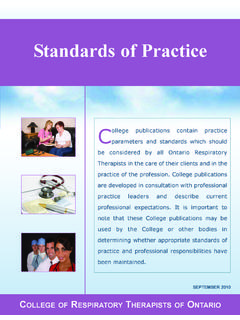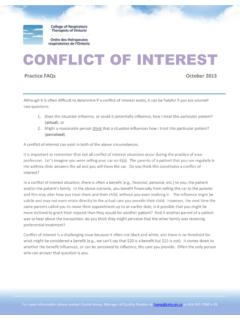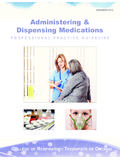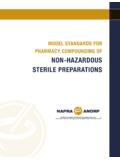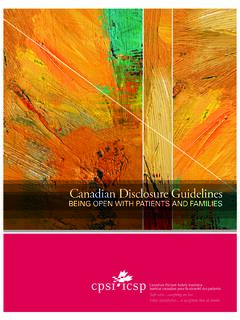Transcription of Administering & Dispensing Medications
1 college OFRESPIRATORyThERAPISTS OFONTARIONOVEMBER 2014P R O F E S S I O N A L P R A C T I C E G U I D E L I N EAdministering & Dispensing MedicationsPage | 2 Administering & Dispensing Medications Professional Practice GuidelineProfessional Practice GuidelineCollege of Respiratory Therapists of ontario (CRTO) publications contain practice parameters andstandards which should be considered by all ontario Respiratory Therapists in the care of theirpatients/clients and in the practice of the profession. CRTO publications are developed in consultationwith professional practice leaders and describe current professional expectations.
2 It is important to notethat these CRTO publications may be used by the CRTO or other bodies in determining whetherappropriate standards of practice and professional responsibilities have been and references are hyperlinked to the Internet for convenience and referenced to encourageexploration of information related to individual areas of practice and/or interests. Bolded terms aredefined in the : November 2014 Originally Published: 2005It is important to note that employers may have policies relatedto an RT s ability to accept delegation to dispense Medications . Ifan employer s policies are more restrictive than the CRTO sexpectations, the RT must abide by the employer s an employer s policies are more permissive than theexpectations of the CRTO.
3 The RT must adhere to the expectationsof the & Dispensing Medications Professional Practice GuidelinePage | 3 INTRODUCTION 4 ADMINISTRATION 5 The 9 Rights of Competent medication Administration 6 medication Management Systems 6 Oral and Topical medication 6 Over the Counter (OTC)
4 medication 7 Dispensing 8 When it s Appropriate for an RT to Dispense 8 Accepting Delegation to Dispense 9 Who an RT Can Accept Delegation From 9 TABLE 1: Who can order medication and who can order Dispensing medication .
5 10 Orders for Dispensing 10 Factors to Consider when Accepting Delegation to Dispense 10 Labeling dispensed medication 11 Safe storage and handling 11 DOCUMENTATION 12 Dispensing PROCESS MAP 13 SPECIAL CONSIDERATIONS 14 Substitution Policies
6 14 Repackaging 14 Narcotics and other Controlled Substances 14 Dispensing Samples 15 medication Errors 16 Glossary 17 References 18table of contentsPage | 4 Administering & Dispensing Medications Professional Practice GuidelineIntroductionThe Regulated Health Professions Act, 1991(RHPA)
7 Identifies thirteen controlled actsthat posesignificant risk of harm to the public of ontario [RHPA section 27(2)]. Dispensing Medications fallsunder the 8thcontrolled act in the RHPA: Prescribing, Dispensing , selling or compounding a drug as defined in the Drug and PharmaciesRegulation Act, or supervising the part of a pharmacywhere such drugs are kept. The Respiratory Therapy Act, 1991(RTA) does not authorize Respiratory Therapists(RTs) to performthis controlled act, the authorityto dispense Medications must be delegated to an RT from anotherregulated health care professionalthat is authorized to dispense and to delegate Dispensing ( ,physicians).
8 Therefore, RT s can only receive delegationfor the Dispensing portion of this controlledact. Respiratory Therapists must not prescribe, sell or compound a drug, or supervise the part of apharmacy where such drugs are kept. For additional information, please see the Interpretation of Authorized Actsand Delegation ofControlled ActsProfessional Practice Guidelines (PPGs).Other legislation regulating the practices of prescribing, Dispensing , selling, or compounding a drug,and supervising a pharmacy, includes but is not limited to:Provincial Legislation: Pharmacy Act, 1991 Drug and Pharmacies Regulation Act, 1990 Drug Interchangeability and Dispensing Fee Act, 1990 Narcotics Safety and Awareness Act, 2010 Federal Legislation.
9 Food and Drugs Act, 1985 Controlled Drugs and Substances Act, 1996 Narcotics Control Regulation (amended 2014)Please regulated health care professionals who are authorized to perform this controlledact in its entirety, or parts of it, have additional regulations and standards guiding thesepractices. For example, only pharmacists and wholesalers are permitted to sellmedications. Selling implies the possession of the medication . RTs cannot acceptpayment for Medications dispensed or invoice clients on behalf of their employers. Administering & Dispensing Medications Professional Practice GuidelinePage | 5 ADMINISTRATIONRTs commonly administer Medications via theauthority granted to them by the RespiratoryTherapy Act- Administering a substance byinjection or inhalation [ (4)].
10 Dispensing occursless often, and will be explained later in this are responsible for Administering medicationswithin both their personal and professional scope ofpractice. The safe and competent administration ofmedication requires the RT to have thecompetencies (knowledge, skill and abilities) to: assess the appropriateness of a particularmedication for the patient/client, includingindications and contraindications; be aware of the actions, interactions, dose, route, side-effectsand adverse effects of the drug; be able to calculate the correct dosage and prepare themedication correctly, when necessary.



